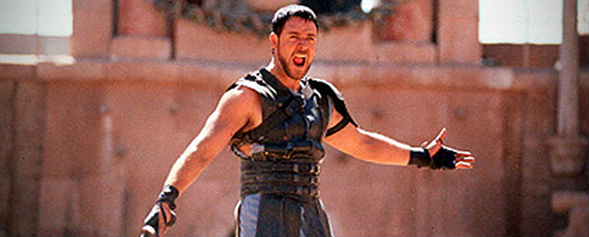We all know the iconic scene from the movie Gladiator: when Maximus (then known as The Spaniard) defeats six opponents single-handedly in just over one minute.
He had given the crowd the blood that they wanted, but as the dust settled after the one-sided battle, he wasn’t rewarded with the thundering applause he had come to expect—instead his actions were met with shocked silence. Frustrated at this lack of reaction, Maximus hurls his sword into the stands, spreads his arms wide, and asks the question that would be forever immortalized in the minds of 90’s babies around the world.
“Are you not entertained?”

There are two major types of motivation at work here: external motivation (giving the crowd what they want) and internal motivation (not wanting to die). As a type of entertainer, a gladiator would have to walk the line between the two, taking his motivation from both sources at once. He would need to please the crowd to stay in their favor, and obviously he would need to stay alive.
So we can understand why Maximus acted the way he did in this scene: he had managed to survive the battle, but in the silent moments after bloodbath Maximus didn’t gain the favor from the crowd that he had expected. He threw his sword into the crowd to voice his frustration. He spreads his arms open wide, showing the crowd the red sand of the arena, showing the crowd what he had done.
I killed these six men for your entertainment! “Are you not entertained?”
—~~~:::~~~—
Well believe it or not, a writer’s motivation is very similar to that of a gladiator: writers work hard to produce quality material out of a desire to entertain our audience (extrinsic motivation) and because we love what we do (intrinsic motivation). We walk a similar line, face similar challenges, share similar frustrations, and similar pitfalls.
Of course, not many writers are thrown into an arena against their will and told to ‘Die well’ to give the audience a good show, but then again, sometimes we can’t help but feel that way.
For example: over the past few weeks, I’ve been feeling a lot like Maximus—only, I don’t have a sword to throw at the audience to relieve my frustration—and my writing has suffered because of it.
Like so many other’s before me, I fell into the trap that has ended the careers of thousands of young bloggers/writers all over the world. I started to look for praise from my audience and I wanted more recognition for my work.
I’m actually pretty embarrassed about it now; but in my mind, I saw myself standing in the middle of an arena, my arms spread wide as I glared at my audience. I spend hours creating this content for your entertainment! I thought. Are you not entertained?
(Which, as I look back on it now, sounds an awful lot like “Attention! give me Attention! You owe ME for reading these things that I’m putting on the internet for free!” )
Ridiculous.
While outwardly I was considering myself a “professional” writer, In my head I was more like a toddler throwing a tantrum.
That sort of thinking by itself could have easily destroyed my career before it has even taken off. Can you imagine the horrible, self gratifying, self focused, ego padding posts that I would have published here if I had continued down that path? That’s not a pretty picture, and not one that I like to think about.
But here’s the real problem with writers (especially writers who are just starting out) looking for praise from the audience
Motivation.
Sure, having an audience applaud your efforts and praise you for a job well done is incredible motivation for a young writer, but be careful.
Praise is like a drug: you get one small taste and you start to want more, and more, and more, until suddenly, the only reason you’re writing is for the praise of the audience. Or in other words, you now rely entirely on the applause from the audience to keep you writing.
This is why balancing internal and external motivation is so important.
If you were to fall into this bottomless pit of writing for praise (pure external motivation), what happens if the praise stops coming? What happens if the audience goes silent? No cheering, no applause,nobody there to validate your hard work. What happens when the external motivation you rely so much on to keep writing, is suddenly gone?
Well, if you fall into this trap, If you don’t balance a healthy dose of internal motivation along with your external motivation, then simply put…
When the praise stops, the writing stops.
And as much as I hate to admit it, that’s what happened to me (as well as the whole temper-tantrum thing) I forgot who I was… again; I lost sight of why I started this website—not for praise, but to learn. I guess I just didn’t expect all the lessons to be so hard.
If you skipped over everything else, read this.
The key to sitting down to write day after day, rain or shine, whether you have a big audience or not, is to stay motivated. And the key to staying motivated is to balance the desire for applause, with the desire to survive… the novel. (Sorry, couldn’t resist)


